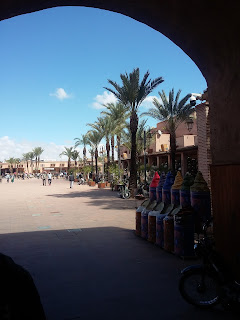I went to visit a friend’s flat in Guéliz, the
so-called ‘Nouvelle Ville’ of Marrakech: called this originally by the French when
they built it in order to provide a modern alternative to the old medina (they
did this in most Moroccan cities). One of their first constructions was a
Catholic church and the story goes that ‘Guéliz’ is a Moroccan corruption of
the French for that – ie, église. Nowadays, Guéliz is only modern in a few
choice areas, with some shiny cafés and boutiques and a couple of malls, but
most of it now is not so very modern … and many of its attractive 1930s
buildings are falling into complete disrepair (an old cinema going this way
really grieves me - see below, the cinema and an artist's imagined queue).
Anyway, my friend told me to take a taxi to ‘Victor
Hugo’, and this turned out to be a large grammar school which lies at the end
of the long and busy Avenue Mohammed V.
It was quite a new area for me and I phoned her for more directions when
I arrived, but struggled to hear what she was saying as suddenly I was
surrounded by a seemingly non-stop stream of kids pouring out of this school,
screaming and shouting at each other, revving up noisy scooters or heading for
fancy cars.
From her
sunny balcony on the fifth floor we gazed down at the corner opposite the school,
full of inviting-looking salad bars and patisseries. My friend explained that
it is the city’s rich kids who go to Lycée Victor Hugo, the only purely
French-speaking school in Marrakech, private and expensive. And as these kids
are all free between 12 and 2 – no lunch is offered on the school premises –
many pour across the road to the salad bars to spend up to 10 euros a day on
their lunches … quite a lot for a school lunch! If they do NOT stop in the zone
for lunch, they are picked up by mums or drivers in expensive Range Rovers and
the like.
Then I found
out that the flat actually sits between TWO large secondary schools – one the
exclusive Victor Hugo, and the other a big state school called College la
Princesse Lalla Meriem (Lalla Meriem is the King’s big sister). So there is
quite the event at midday each day when a huge, noisy outpouring of youth
emerges from both these two establishments for lunch. The rich kids are either
collected in 4x4s blocking the road and blaring their horns, or they leave on
motos and scooters. Meanwhile the state school kids emerge on bicycles (two on
each) or run down the main boulevard in the traffic. Others hang onto the back
of trucks (which they grab at the traffic lights) in order to get a dangerous
but free ride down to the military zone where most of them live – my friend
said that in many cases their parents were probably not from Marrakech
originally. The area where they go is called Camp el Ghaoul, which
was an old military encampment even before the French built on it.
So, the state kids make their chaotic way down the road as rich kids make their
way up it, but – and here’s the weird
thing – my friend commented that although both groups often fight amongst
themselves, they NEVER clash with the other set.
It as though, coming from two completely different
worlds, they just do not see each other.
And this dichotomy is repeated in the eating situation
in the area. As I said, many rich kids sit eating in the fancy salad bars, but
the state kids head for home. Meanwhile, a mere two streets up – where the
situation changes dramatically and there are many smaller older cafés and
stalls – tables are full to bursting with workers from offices and building
sites nearby. And here you can buy a tasty tagine for just 20 dirham (2 euros).
But we went
to eat in one of the trendy salad places near my friend’s home, fighting our
way through the neon-coloured backpacks and roaring motos. You could hear some
of these kids deliberately speaking French to each other – a type of status
symbol, as Moroccan Arabic is almost certainly bound to be their mother tongue.
‘In this
part of Marrakech,’ said my friend dryly, ‘it is all “regardez mon Range Rover”
… but you don’t have to move far before you get back to the “donnez moi un dirham”
…
This is
Marrakech today. I think I fancy a 20 dirham tagine.







